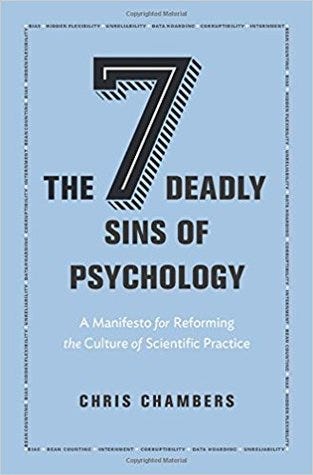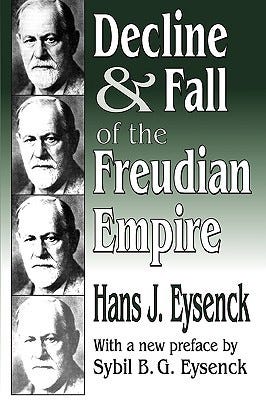2019 in books
I document my reading habits on Goodreads platform, so it's easy for anyone to follow along. I don't review all books I read, just when I feel like it. I do however rate them all. 2019 is over, so I can look back at the year and see what I read. Below, I organized them by broad style of book. They are all nonfiction because I don't read fiction.
Psychology books
The Seven Deadly Sins of Psychology: A Manifesto for Reforming the Culture of Scientific Practice by Chris Chambers
A neat introduction to current problems of psychology, replication crisis, low power, p-hacking and so on.

Evolutionary Psychopathology: A Unified Approach by Marco del Giudice
Read this because of the SlateStarCodex review. It's definitely an interesting take to psychopathology (mental illness) that left me with many ideas to pursue.
The Intelligence of Nations by Richard Lynn & David Becker
This is a book length introduction to David Becker's recalculation of Richard Lynn's national IQ database. It's still incomplete. I published a review of this.
The IQ Argument: Race, Intelligence, and Education by Hans Jürgen Eysenck
Eysenck's book on race and intelligence. Quite entertaining, as most of his books are.
Race, Intelligence, and Bias in Academe by Roger Pearson
Since I have been studying political bias in media and academia, this was on my to-read list. Not being previously familiar with Pearson's work, only that he's very hated. In fact, Turkheimer tried to shame me about him already, which naturally has the opposite result of just making me more curious.
Whiteshift: Populism, Immigration and the Future of White Majorities by Eric Kaufmann
Only partially a psychology book. Since I work a lot with immigration and politics thereof, this was an obvious to read book. It's pretty good!
Is education still the universal solvent? by Stig Hebbelstrup Rye Rasmussen
PhD thesis by some Danish guy. Not too interesting, just skim the published papers instead.
The Psychology of Politics by Hans Jürgen Eysenck
Another good Eysenck book which taught me a lot despite being very old, 1954! Reviewed here.
Decline and Fall of the Freudian Empire by Hans Jürgen Eysenck & Sybil B.G. Eysenck
Eysenck's classic takedown of Freudian psychology. Definitely recommended.

Genetics
Understand Your DNA: A Guide by Lasse Folkersen
A fairly basic introduction to genomics. Mainly read this because the author is Danish and so could be relevant to network with.
Biography
Amusing autobiography by an eminent biologist and oddball.
History
In Denial: Historians, Communism, and Espionage by John Earl Haynes & Harvey Klehr
Overview of left-wing bias in the study of history. For anyone familiar with the evidence of left-wing bias in psychology, this won't be surprising. The disturbing part is that many historical facts might not really be so.
Secret Cables of the Comintern, 1933-1943 (Annals of Communism) by Fridrikh Igorevich Firsov, Harvey Klehr, John Earl Haynes, Lynn Visson (Translator)
Similar to the above, but focused on the Comintern.
Blacklisted by History: The Untold Story of Senator Joe McCarthy and His Fight Against America's Enemies by M. Stanton Evans
Similar to the above, but specifically about McCarthy's legacy. Before reading this book, I held the typical opinion of being against McCarthy as overly zealous, but history has later mostly vindicated him. So I no longer use McCarthyism as a negative adjective. The communist infiltration was mostly real.

Contested Will: Who Wrote Shakespeare? by James Shapiro
Mainly read this because of the articles in Reliable Media™ about people proposing new poor history where Shakespeare is a woman, promoted by Amazing Amy, of course.
Methods books
Applied Time Series Analysis: A Practical Guide to Modeling and Forecasting by Terence C Mills
I was doing some time series analysis and was wondering about the theoretical background. This book sucks though.
Intro to GIS and Spatial Analysis by Manuel Gimond
Brief and useful introduction to working with spatial data in R. I've been increasingly working with spatial data for the purpose of map making, and dealing with omnipresent spatial autocorrelation in datasets of political units.
Deep Learning with R by Abhijit Ghatak
Short introduction to deep learning with R. Not very good.
The Book of Why: The New Science of Cause and Effect by Judea Pearl & Dana Mackenzie
A kind of introduction to Pearl's way of thinking about causality. Worth reading but flawed. I reviewed it in length here.
The Art of Statistics: Learning from Data by David Spiegelhalter
A neat and brief introduction to statistical thinking.
Other
How to Measure Anything: Finding the Value of "Intangibles" in Business by Douglas W. Hubbard
As the title says, a kind of introduction to applied decision theory by trying to aggressively quantify everything.
Lost in Math: How Beauty Leads Physics Astray by Sabine Hossenfelder
Author is an annoying neurotic feminist, but this is a neat book about the issues of science in physics for those of us who don't have the background to read the primary literature.
Loonshots: How to Nurture the Crazy Ideas That Win Wars, Cure Diseases, and Transform Industries by Safi Bahcall
Fairly typical Silicon Valley take on science history and how to move stuff along.
Not Even Trying: The Corruption of Real Science by Bruce G. Charlton
Charlton used to run a journal Medical Hypotheses which published a lot of non-medicine, and which used editorial review instead of the slow peer review. Thus, his book about science progress could be interesting, but it wasn't.
Kindly Inquisitors: The New Attacks on Free Thought by Jonathan Rauch
Good defense of free speech/thought . Reviewed in detail here.

The Madness of Crowds: Gender, Race and Identity by Douglas Murray
Fairly boring. Essentially some commentary on various recent SJW insanity.
Network Propaganda: Manipulation, Disinformation, and Radicalization in American Politics by Yochai Benkler, Robert Farris, Hal Roberts
Essentially an academic book that defends the idea that right wing media are uniquely bad using network analysis. Does not really properly consider the problem of political bias in media except in a few amusing places where it is casually dismissed. I still recommend it as something to read from the other side, especially because it presents a lot of data well.

